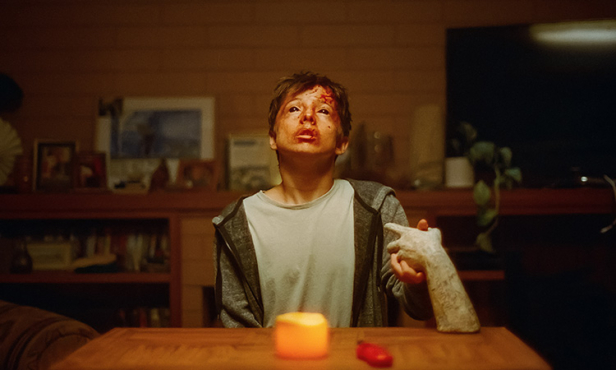Talk To Me opens with one brother on an anxious quest for another, desperate to talk to him. The camera tracks Cole (Ari McCarthy) as he walks to and through a crowded house party, frantically searching for his brother Duckett (Sunny Johnson) – and when he locates Duckett locked in a bedroom, Cole’s sense of urgent desperation is confirmed by the way he smashes in the door. “He’s definitely on something, ay?”, one of the partygoers had said of Duckett – and sure enough, Duckett is sitting there, alone on the bed, shirtless, covered in cuts and babbling. “Can you see them, they’re in here,” he says to Cole, adding, “Pop said you’re going to hurt a lot of people.” Trying to talk his brother down, Cole says gently, “Pop’s dead,” to which Duckett responds, looking at his brother, “You’re not him.” As Cole tries to stop the other teens filming the delirious Duckett with their phones, Duckett suddenly plunges a kitchen knife first into his brother’s chest, and then – fatally – into his own head.
Fraternal communications were no doubt more salutary behind the scenes. For co-directors (and twins) Danny and Michael Philippou now join the ranks of Peter and Michael Spierig, Paul and Ben China, Colin and Cameron Cairnes, and Kiah and Tristan Roache-Turner, as brothers working together in Australian horror filmmaking.
While the Philippous had previously made and starred in the TV miniseries RackaRacka (2013-1206) and had crewed on Jennifer Kent’s The Babadook (2014), Talk To Me is their debut feature as directors. It is also one hell of a strong calling card – impressively mounted and viscerally arresting from the get-go. This film draws us in fast, and once we are hooked, does not let us go.
While the prologue, and its significance, are left ominously hanging, the film shifts its focus to another set of teens. Like Cole and Duckett, high school senior Mia (Sophie Wilde) has lost a parent, and is still in a swirl of dolour, depression and denial over the circumstances of her mother Rhea’s death.
While her father Max (Marcus Johnson), shot out of focus like a ghost, tries vaguely to reach out to her, the two are as yet incapable of addressing their grief together – and so Mia turns for consolation and company to her best friend Jade (Alexandra Jensen), Jade’s younger brother Riley (Joe Bird) and their tough-talking mother Sue (Miranda Otto), as the very model of stable, loving family that Mia herself has lost. Further connecting Mia to this clan, while also marking a boundary of her separation from it, Mia’s ex Daniel (Otis Dhanji) is now Jade’s boyfriend.
Drawn in by circulating videos that show their contemporaries in an othered state, Jade and Mia seize an opportunity to “see if it’s real” and maybe even to experience for themselves what is going on – and they allow Riley to tag along. So at another house party, they participate in a ritual which involves holding a ceramic hand (that possibly houses a real, severed one), summoning a spirit with the words ‘Talk to me’, and then allowing it to take temporary possession with the words ‘I let you in’. Hayley (Zoe Terakes) and Joss (Chris Alosio), who look after the hand, warn of dangers attached to the process – the spirits, often malevolent tricksters, want to stay – and so put in place strict rules of safeguarding. Yet as any teenager knows, rules are made to be broken, and on her very first go, Mia exceeds the prescribed 90 seconds…
With its peer pressure, its central act of transgression, and its potential for escapist ecstasy, this is a classic teen rite of passage, not unlike these kids’ tentative forays into smoking, drinking, drug-taking and sex – and like any rite of passage, for most it is a bit of harmless fun (with the risk being an essential, edgy part of the fun), while for the vulnerable (like Mia and sensitive, sexually confused Riley) it can be terrifying, traumatising and leave permanent scars, both psychological and physical. Yet this is also a literal rite, forging a bridge between our world and an infernal plane – and so the Philippous can vivify and intensify the trials of adolescent angst through the thrilling language of genre.
This is a harrowing story of mental breakdown, merely appropriating the form of a horrifying ghost story – and so, amid all the revenant scares and interdimensional incursions, Talk to Me communicates hard inner truths across the divide. Broken and confused by her conflicting feelings towards her mother, Mia sets out to make contact with what is always just out of her reach – and on this quest for impossible answers, she must reflect upon her own spiritual emptiness, and the deeper yearning to find a way back to her own humanity.
Talk To Me is a sensational first film, showing a real maturity and emotional intelligence that is just beyond the grasp of its adolescent characters. Meanwhile we find ourselves on the other side of the screen (much as Mia watches videos of her late mother on her phone), looking in from the outside and seeking our own meaning in people through whom we can live only vicariously, and temporarily.
Here it is the Philippou brothers’ unnerving art, rather than an embalmed hand, that is the medium for all this projection, transference and rôle play, designed to get into your head. Be careful, or they will have you forever.
Talk To Me played at Sundance London 2023 and will be released in cinemas on 28 July 2023.
For more reviews, news and exclusive interviews, head to SciFiNow, bringing you the world’s best sci-fi, fantasy and horror.



